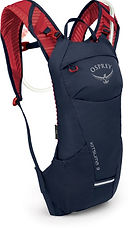
What kind of hiking backpack should I buy?

NOT ALL HIKING BACKPACKS ARE CREATED EQUAL
There are a ton of backpacks available for you to purchase, in a wide variety of shapes, sizes, and prices. It can be super confusing trying to select the right one - and there actually is a RIGHT one. A good backpack can last you 10+ years, so it's important to make the right investment. Here are the 3 basic hiking backpack categories to get you started. Continue below for what to look for when choosing one and what to avoid.
What to look for when choosing a hiking backpack
1. Size DOES matter, after all!
When selecting a day pack or hydration pack, they are pretty standard in size. You can choose any size for these types of hiking backpacks, as most hydration bladder packs will hold 2.5 liters. Now with backpacking packs, there is no "one size fits all." It is important to select a backpacking pack that is proportionate to your body. Good News - REI Co-op will size you in store at no charge and even help you find the right backpack for your travel and hiking needs.
2. Water Resistant Material
Make sure your backpack is made with semi-waterproof material so that your belongings inside stay dry in the event of a light rain shower. Although your pack doesn't need to be 100% waterproof, it's important to have water resistant material since weather can be unpredictable. In the event of a torrential downpour during a multi-day hike, most backpacking packs come with a built-in tarp to cover your entire backpack.
3. Compartments and Pockets
This is a MUST! A great backpack will have many different compartments and pockets, not only to hold more items, but to also keep you organized. Most pockets will be lined with the same water-resistant material, so this comes in handy when you are carrying items that you don't want leaking into other compartments (like bug repellent, sunscreen, etc..). Also, a little pocket on the hip belt is perfect for chapstick!
4. Padding on back, shoulder, and hip belt
This may seem like an obvious necessity for a backpacking pack, but it's also very important for all backpacks, and here's why:
-
Back padding - lumbar-shaped packs distribute weight more evenly and make it more comfortable. This padding creates an airway between your back and the backpack, keeping you cooler and less sweaty.
-
Shoulder padding - padding on the shoulder straps is so important, as some (or most) weight will be on your shoulders. The padding keeps the straps from digging into your shoulders, making it much more comfortable.
-
Hip belt padding - the most important for backpacking packs, as most of the weight will be pushing down on your hips. The padded belt will help support the weight of the pack and lessen the strain on your back/shoulders.
5. Front loading or Top loading
This is a personal preference, and there is no right or wrong choice. Front or top loading packs are in reference to backpacking packs. Top loading means there is one big opening at the top of the pack where you store your belongings. Front loading means there is also access from a zipper on the front/side that opens your backpack up entirely. Front loading offers better access to your belongings, but you'll find that most backpacking packs are top loading. I own a great top loading backpack and don't run into any issues with it while on multi-day hikes.
6. TSA Carry-on size restrictions
Day packs and hydration packs (liquid removed) are allowed as carry-ons all day, every day. Backpacking packs are allowed as carry-ons as well, so long as they fall into the TSA sizing requirements for carry-on luggage, 22 x 14 x 9 inches. If you also have a carry-on suitcase, you will more than likely need to check one of the items.
7. Cost - What to consider & where to buy
-
Day pack: $60 - $180
-
Hydration pack: $40 - $120
-
Backpacking pack: $150 - $300
It is not necessary to spend more than $300 on a backpacking pack. You might get some extra bells and whistles, but sometimes those "extras" also increase the weight of the pack. On the contrary, you pay for what you get. Sure Amazon has some great "deals" on backpacks, but they may be made of cheap material and fall apart quickly. Don't risk it!
I really like purchasing items from REI Co-op, Mountain Warehouse, and Eastern Mountain Sports (EMS). REI is my go-to for all things hiking related because you can usually find a store near any big city. They also have a one year warranty and return policy. If something happens to you gear, you can take it back, even after you've used it.
8. What to avoid when choosing a travel backpack
Basically, everything NOT on this list (ha!). No... but seriously. You'll want to avoid material such as leather, knit, or anything non-water resistant for your backpack. Don't choose a backpack that has no padding, your shoulders will be in tremendous pain. It's also a good idea to try on your backpack in person before purchasing it, ensuring it feels right. Lastly, avoid purchasing a backpack from a store/online where you cannot return or exchange it!







